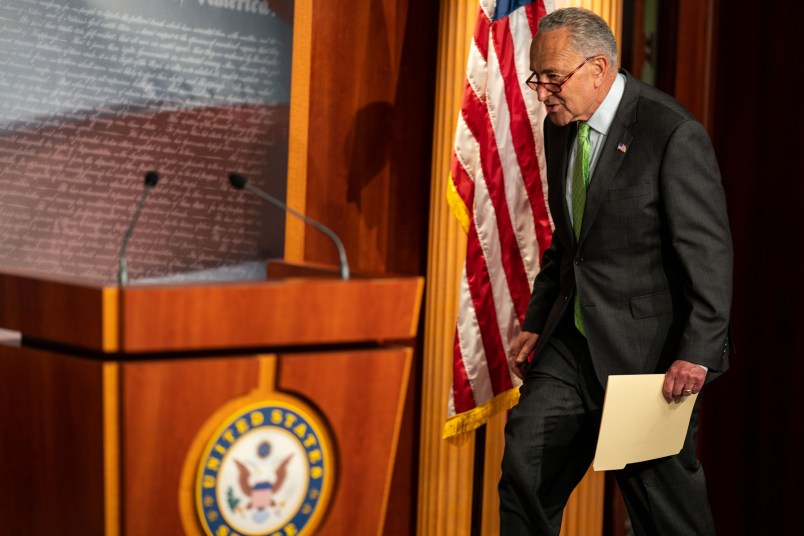This week, the Senate is hurtling towards a determinative moment on the bipartisan infrastructure deal.
On Thursday, Senate Majority Leader Chuck Schumer (D-NY) set up a vote to move the bill to debate for this Wednesday. Some Republican negotiators in the group groused about the move, saying they won’t vote to proceed to debate — a vote that precedes final passage — if the bill’s text is still not finished.
Schumer’s camp retorts that this is the timeline he’s been previewing all along, and that even if the bill needs more work, that shouldn’t keep members of the group from voting to at least debate the bill’s contents.
This drama could consume the first half of this week. But ultimately, this deal is lower stakes for Democrats than the sweeping $3.5 trillion budget package to be passed through reconciliation that they’re working on simultaneously. The bipartisan deal is much smaller and narrower.
While it would give Democrats and President Joe Biden a bipartisan legislative victory, Democrats have been pretty clear-eyed about the realities here: rustling up 10 Republicans to vote on pretty much anything Democrats want to do has always seemed remote. And if the bipartisan deal collapses, they can wrap some of those proposals into the reconciliation bundle — assuming that moderates allow a higher topline to encompass the “hard infrastructure” provisions.
This week, the Senate is hurtling towards a determinative moment on the bipartisan infrastructure deal.
On Thursday, Senate Majority Leader Chuck Schumer (D-NY) set up a vote to move the bill to debate for this Wednesday. Some Republican negotiators in the group groused about the move, saying they won’t vote to proceed to debate — a vote that precedes final passage — if the bill’s text is still not finished.
Schumer’s camp retorts that this is the timeline he’s been previewing all along, and that even if the bill needs more work, that shouldn’t keep members of the group from voting to at least debate the bill’s contents.
This drama could consume the first half of this week. But ultimately, this deal is lower stakes for Democrats than the sweeping $3.5 trillion budget package to be passed through reconciliation that they’re working on simultaneously. The bipartisan deal is much smaller and narrower.
While it would give Democrats and President Joe Biden a bipartisan legislative victory, Democrats have been pretty clear-eyed about the realities here: rustling up 10 Republicans to vote on pretty much anything Democrats want to do has always seemed remote. And if the bipartisan deal collapses, they can wrap some of those proposals into the reconciliation bundle — assuming that moderates allow a higher topline to encompass the “hard infrastructure” provisions.

